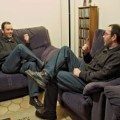Tom: Are you a teacher here?
Martin: No I'm not, I'm actually a graduate student. Tom: Oh right.
Martin: My name is Martin.
Tom: Hi.
Martin: Hi how are you?
Tom: I'm Tom. Martin: Nice to meet you Tom.
Tom: Where are you from Martin?
Martin: I'm from Seattle, Washington in the US. Tom: Is that in the Northeast? Northwest?
Martin: Northwest. Right near Canada.
Tom: Is it cold up there?
Martin: It's wetter than it is cold. Tom: How long have you been in Japan.
Martin: I've been in Japan for about 6 months. Tom: And what are you studying?
Martin: I'm studying international cooperation and economics and nationalism in Northeast Asia. Tom: Is that a master's level or a Ph.D. Martin: Master's level. Tom: Right. How long is the course?
Martin: Oh, it's about 2 years so I'll be done in another year. Tom: So you're fairly settled here then? Martin: By and large, yes.
Martin: How about you?
Tom: I'm from the UK. Actually I'm a teacher here. I'm not studying. Martin: Oh, how long have you been a teacher here?
Tom: I just started this semester about 2 months ago.
Martin: Oh 2 months --very, very recent. How do you find Japan?
Tom: It's brilliant. I really like it.
Martin: Have you been in Japan a long time or... Tom: I was in Japan 4 years ago for 2 years. I've been trying to come back since I left. Martin: I find Japan very, very, very nice. The environment is very nice.
Tom: I mean this is quite a small city.
Martin: I lived in Seoul for about 3 and a half or 4 years and it's nice to have a smaller cleaner city that's a little more laid-back, not so rush rush. Tom: So tell me about your day. What do you do in a day?
Martin: Generally pretty standard, you know, come up to campus in the morning, study, have class, and then read a little bit, go to the library, and then go back home and go off to work in Oita.
Tom: You work?
Martin: Yeah, just in Oita for one or two days a week.
Tom: OK. Oh that sounds like a nice schedule.
Martin: Yeah, how about you? You're here for how long a day? Tom: Oh. I get the first bus up in the morning. It gets me here at about 8 o'clock. I have only 3 classes in a day so it's only, what, about four and half hours of teaching. The rest of the time is preparing the lessons, marking the homework, surfing the internet, using the library as well. And then I head home about 6 o'clock. Martin: Doesn't sound.well, a little busier but. Tom: It's quite a relaxing schedule, not too intense. And getting home at 6 or 7, I've still got time for a swim or to cook something in the evening. Martin: Do you go to the club down there or.
Tom: The public swimming pool next to the park.
Martin: Ah, OK.
Tom: Have you been there?
Martin: No I haven't. But I've walked by there. Tom: Do you live in that part of Beppu?
Martin: I live in Kamagawa so quite far away from everywhere else but it's nice and very, very quiet. Tom: That seems like it's important to you. Martin: As I get older, it gets more important, so.

